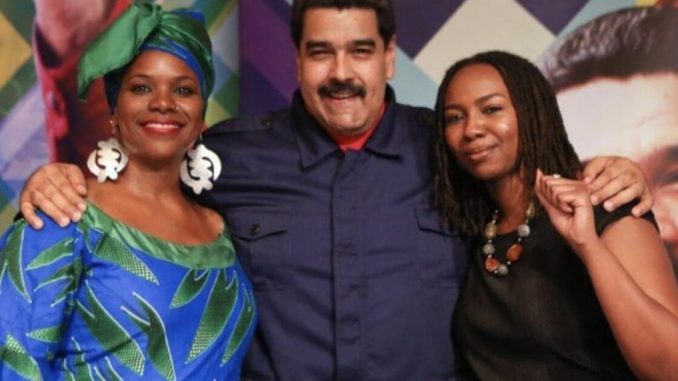
Published October 29, 2025
When U.S. prosecutors labeled Nicolás Maduro’s government a “narco-terrorist regime,” few imagined the Venezuelan leader’s reach might extend far beyond drug cartels and oil fields. But recent reports suggest the regime’s influence network is far wider—and far more dangerous—than the world previously knew.
According to testimonies cited by the Washington Examiner and The Daily Signal, defectors from inside the Bolivarian regime claim that as early as 2012, Hugo Chávez and later Nicolás Maduro secretly funneled millions of dollars into U.S. left-wing groups, including movements tied to Black Lives Matter and Antifa. The purpose, they allege, was to export Venezuela’s revolutionary socialism to American soil and sow division within the United States.
The Narco Regime’s Hidden Network
Sources claim that suitcases filled with cash—up to $20 million—were delivered to U.S. activists through intermediaries linked to Caracas. If true, the funding would mark one of the most ambitious foreign interference operations by a Latin American regime in modern history. Analysts note that Venezuela’s alignment with Iran, Hezbollah, and other anti-Western actors has transformed it into a hub for hybrid operations—blending ideology, organized crime, and digital influence.
PJ Media reports that Maduro’s allies have courted radical activists across continents, hosting “anti-imperialist” summits in Caracas and inviting American socialist leaders to attend. Simultaneously, Venezuelan intelligence services have deepened their cooperation with Tehran, allowing Hezbollah-linked networks to flourish in the Western Hemisphere. These alliances, sustained by illicit gold and drug revenue, form what security experts call a shadow alliance of anti-U.S. regimes and movements.
A Shadow Economy in Motion
The rise of this parallel network reveals how sanctions can inadvertently drive authoritarian states to innovate outside the law. Cut off from global banking, Venezuela now trades oil and gold through intermediaries in Russia, China, and Iran. It uses cryptocurrency to bypass the dollar, creating an underground financial system beyond the reach of Western regulators.
In this context, ideology becomes another export commodity. Just as the Soviet Union once backed global communist movements, Maduro’s Venezuela uses illicit funds to cultivate ideological allies abroad. By financing activism and exploiting Western unrest, the regime distracts attention from its domestic failures and gains leverage in the global information war.
Weaponizing Division
Beyond the economic and geopolitical angles lies a deeper threat: the weaponization of social movements. If foreign money helped fuel even a fraction of America’s political chaos, then the battlefield of influence is no longer overseas—it is domestic. Disinformation, emotional narratives, and street protests become strategic tools to weaken democratic societies from within.
For content moderators, intelligence analysts, and civil society watchdogs, this presents a new frontier of hybrid warfare. The challenge is not just identifying false posts or propaganda—it’s tracing the hidden financing and intent behind them. Modern regimes don’t need to invade borders when they can infiltrate minds.
 Implications
Implications
🧭 1. Geopolitical Implications
Foreign Influence Operations
-
If Venezuela indeed funded or supported radical groups like BLM or Antifa, it demonstrates how authoritarian regimes can export ideology and manipulate social unrest in democratic nations.
-
It mirrors Cold War-style proxy influence, where regimes like the USSR sought to spread socialist movements abroad.
-
Modern parallels: Iran supports proxy militias; China influences via trade and tech; Venezuela uses ideology and illicit funds.
Axis of Anti-U.S. Alliances
-
The reported network between Venezuela, Iran (via Hezbollah), and leftist movements hints at a new “shadow alliance” of anti-U.S. actors.
-
This could lead to regional instability in Latin America, making it harder for the U.S. to maintain influence in its traditional sphere.
Security Threats
-
Narco-funded ideological groups blur the line between terror financing and activism.
-
Such operations can undermine U.S. domestic security and complicate counter-intelligence efforts, especially if illicit money enters American NGOs or movements.
💰 2. Economic & Trade Implications
Sanctions vs. Tariffs
-
The U.S. and allies may expand non-tariff barriers (like sanctions) targeting Venezuela’s oil, gold, and cryptocurrency exports.
-
This further isolates Venezuela from the global economy, forcing it to rely more on illicit trade channels — creating a feedback loop of corruption and black-market dependency.
Parallel Economies
-
Like the USSR during the Cold War, Venezuela is operating a shadow economy, sustained by drugs, smuggling, and gold transactions through non-Western allies.
-
These channels weaken global trade transparency and can destabilize commodity markets (oil and gold especially).
China’s Role
-
As Western sanctions tighten, China and Russia may step in to buy Venezuelan oil or gold at discounted rates, strengthening Beijing’s influence in Latin America.
-
This deepens the global divide: one economic bloc under U.S. rules, another under alternative trade systems (Yuan- or gold-based).
⚖️ 3. Social & Political Implications
Weaponizing Activism
-
If foreign money is proven to fund U.S. or Western activist groups, that would delegitimize those movements and undermine genuine social reform efforts.
-
It fuels polarization and erodes trust in grassroots politics — a major victory for any regime seeking to destabilize democracies from within.
Disinformation Ecosystems
-
The reports highlight how foreign disinformation, channeled through sympathetic social media and political groups, can shape public perception.
-
This is directly relevant to content moderation, your field — it shows how narratives can be weaponized to divide societies.
Moral Hazard for NGOs
-
Activist or nonprofit groups receiving funds without verifying sources risk being exploited as soft-power tools by hostile regimes.
-
Western governments may increase oversight of NGO funding, tightening transparency laws similar to the “Foreign Agents Registration Act.”
🌍 4. Strategic Outlook
| Domain | Likely Outcome | Broader Effect |
|---|---|---|
| Latin America | More left-wing populist movements funded by illicit sources | Regional instability; weakened pro-U.S. alignment |
| Global Trade | Sanctions push regimes toward barter & crypto | Undermines dollar dominance |
| U.S. Domestic | Heightened political polarization & mistrust | Easier for adversaries to influence elections |
| Alliances | Stronger coordination among sanctioned regimes (Venezuela, Iran, Russia, China) | “Anti-Western financial ecosystem” emerging |
 Overall Takeaway:
Overall Takeaway:
The Global Web of Influence and the New Face of Hybrid Power
Venezuela’s alleged role in exporting ideology and funneling illicit funds into U.S. activist networks reveals a deeper transformation in modern geopolitics — one that goes far beyond borders, tariffs, and trade routes. Nicolás Maduro’s regime, long isolated by sanctions, appears to have evolved into a laboratory for hybrid warfare, using narcotics money, ideological alliances, and digital narratives as weapons to project influence and destabilize opponents.
This pattern reflects a broader shift among sanctioned or authoritarian states: when cut off from traditional markets, they reinvent themselves as nodes in an alternative global system. In this system, power isn’t measured by GDP or exports, but by the ability to manipulate information, exploit social unrest, and create new circuits of finance that bypass the dollar. Venezuela’s connection with Iran’s Hezbollah, and its reported outreach to leftist groups in the U.S., demonstrate how ideology and illicit trade can merge into a single geopolitical tool.
Economically, this underscores how sanctions — though effective in punishing regimes — often drive them toward darker networks where drugs, gold, and cryptocurrency replace oil and legitimate commerce. These shadow economies ripple through global markets, distorting prices, funding proxy conflicts, and pulling allies like China and Russia into mutually beneficial but ethically fraught trade relationships. Over time, this may weaken the very systems of transparency and rule-based trade that have underpinned Western economic dominance since World War II.
Socially, the implications are even more unsettling. If foreign regimes can covertly influence activism, shape political narratives, or fund protests on U.S. soil, then the battlefield of the future isn’t in distant deserts or oceans — it’s online, in city streets, and inside the minds of citizens. The weaponization of ideology transforms democratic freedoms — free speech, assembly, protest — into potential tools of subversion. For content moderators, intelligence agencies, and civil societies alike, the challenge is no longer merely detecting fake news but tracing the invisible funding and intent behind it.
Ultimately, Venezuela’s alleged operations form part of a new model of asymmetric power: low-cost, high-impact, and deeply psychological. This is not about invading territories, but about corroding trust, both domestically and internationally. If left unchecked, such hybrid tactics could redefine how nations compete — not through trade wars or arms races, but through narrative manipulation and ideological infiltration.
The lessons are clear. Nations must strengthen transparency in activism funding, tighten trade enforcement, and modernize digital oversight to match this evolving threat. The era of influence no longer belongs solely to superpowers; it belongs to those who master the art of hidden networks, economic adaptation, and psychological warfare. Venezuela, under Nicolás Maduro, is merely one of the early architects of that dangerous new order.
SOURCES: THE GATEWAY HISPANIC – Venezuelan Narco Regime Under Nicolás Maduro Provided Over $20 Million to Fund Black Lives Matter, According to Washington Examiner
THE DAILY SIGNAL – How Venezuelan Regime Is Supporting Radical, Left-Wing Groups in US
PJ MEDIA – BLM, Antifa, Hezbollah, and More: Inside Maduro’s Global Web





Be the first to comment